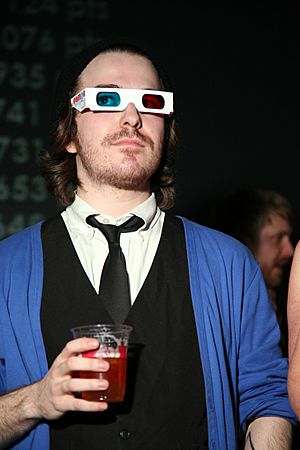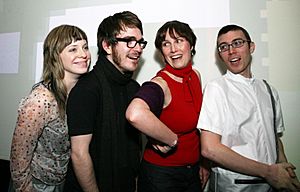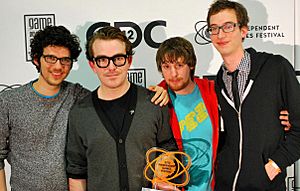Phil Fish facts for kids
Quick facts for kids
Phil Fish
|
|
|---|---|

Fish at GAMMA 3D in 2008
|
|
| Born |
Philippe Poisson
1984 (age 41–42) |
| Occupation | Game designer |
| Employer | Polytron Corporation |
| Known for | Fez |
Philippe Poisson (born in 1984), known as Phil Fish, is a French-Canadian game designer. He is famous for creating the 2012 platformer Fez.
Phil grew up in Quebec, Canada. His love for Nintendo games as a child later inspired his own game designs. He studied game design at the Montreal National Animation and Design Centre. Before starting his own company, Polytron, in 2008, he worked at game companies like Ubisoft.
Fish also helped start Kokoromi, a group that explores new game ideas. He organized game events in Montreal called GAMMA. While making Fez, he also worked on other games like SuperHyperCube. Fez was released in April 2012 after five years of development. It was very popular and well-liked. The making of Fez was even shown in the 2012 movie Indie Game: The Movie. This movie made Phil Fish well-known, which is unusual for game developers.
After some online disagreements, Fish announced he was leaving game development a couple of times. He said he felt unfairly treated by the industry. However, his company Polytron later released the game Panoramical in 2015. Fish also returned with Kokoromi to release SuperHyperCube in 2016.
Early Life and First Jobs
Phil Fish was born Philippe Poisson in Montreal in 1984. His parents shared their love for art and games with him. His father even translated The Legend of Zelda into French so they could play together. Phil says these early memories greatly influenced his game design, especially for Fez. He finished his game design studies in 2004.
Phil started his career at Ubisoft, a big video game company. He worked as a level designer on games like Open Season. He was excited at first, but he found the large teams and working conditions difficult. He later said it was a tough experience.
In 2006, Phil won an award for Best Cut-Scene at the NAD Center Awards. Later that year, he became a level designer at Artificial Mind and Movement. There, he designed levels for games based on movies, such as The Golden Compass.
Phil Fish is a founder of Kokoromi. This group creates and promotes experimental video games. In November 2006, he organized GAMMA 01 Audio Feed, an event that showed games using live sound. He also planned GAMMA 256 in 2007 and GAMMA 3D in 2008. Phil was invited to talk about GAMMA 01 at the 2007 Game Developers Conference.
Phil Fish has been known for sharing strong opinions about video games. At the Game Developers Conference in March 2012, a Japanese developer asked him about modern Japanese games. Phil replied that he thought their games "just suck." Many people thought his comment was rude. However, some, like Mega Man co-creator Keiji Inafune, defended his right to criticize. Phil later admitted he had been rude and apologized for his words.
Creating Polytron and Fez
Phil Fish started working with Shawn McGrath, another indie developer. Shawn had an idea for a puzzle game that showed 2D views of a 3D space. Phil helped with the art for this project. However, they had different ideas for the game. Phil wanted it to be more of a platform game.
Phil continued to work on the game in his free time. He added the idea of voxels, which are like 3D pixels. This meant a 2D pixel could be seen from four sides. This game became Fez. Its design, story, and art all came from this unique game idea. Phil found a programmer named Renaud Bédard, who became the game's programmer.
Fez was first announced in July 2007. It was nominated for two awards at the 2008 Game Developers Conference Independent Games Festival. Phil's employer at the time would not let him take time off to attend the festival. So, Phil quit his job. He said this moment in January 2008 was "when I became indie." Fez got a lot of attention at the festival. This led Phil to start his own company, Polytron Corporation, with a government loan.
Later, Polytron ran out of money. The company was close to shutting down. Then, a neighboring game company called Trapdoor offered to help Polytron. This partnership saved Fez. The game was delayed several times over the next few years, which made it quite famous for its long development.
In 2009, Polytron showed an iPhone game called Power Pill. This game featured a special pill that traveled through human bodies. It used the iPhone's multi-touch screen. While working on Fez, Phil also brought back an old game idea called SuperHyperCube. This game used Wiimote motion controls and 3D viewing. Phil thought it would work better with the new Kinect motion tracking. The updated game was a finalist at Indiecade 2011.
Phil Fish and Fez were a big part of the 2012 documentary Indie Game: The Movie. This movie made Phil famous, which is unusual for game developers. The film followed several indie developers as they made their games. Phil was shown getting ready for the Fez booth at PAX East in March 2011. The movie also showed Phil dealing with a legal problem with a former business partner. This problem put the game's release at risk. The film also showed Phil's deep personal and emotional connection to making the game.
Near the end of Fez's development, Phil felt very tired and stressed. Fez was released on April 13, 2012. It sold 200,000 copies in its first year on Xbox Live Arcade. Game review sites like Metacritic said it was "generally favorable" for Xbox 360 and received "universal acclaim" for the PC version.
While it was being made, Fez won several awards. These included the 2012 GDC Independent Games Festival's Seamus McNally Grand Prize. It also won Best in Show at Indiecade 2011 and Excellence in Visual Art at the 2008 GDC Independent Games Festival. Eurogamer gave Fez a perfect score and named it their 2012 Game of the Year. By the end of 2013, the game had sold one million copies. Phil Fish announced that the game would eventually be available on most video game platforms.
After Fez
Fez 2 is cancelled. I am done. I take the money and I run. This is as much as I can stomach. This isn't the result of any one thing, but the end of a long, bloody campaign. You win.
A sequel to Fez, called Fez 2, was announced in June 2013. A month later, an online argument between Phil Fish and a journalist led to the cancellation of Fez 2. Phil also announced he was leaving the game industry. He said he was tired of the negativity in the industry. This news surprised the rest of the Polytron team.
In June 2014, Phil announced Polytron Partners. This was a new effort by Polytron to help fund and support other indie game projects, like a publisher. Their first game was Panoramical, an "interactive musical landscape" game. In August 2014, Phil's personal and company information was accessed without permission and shared publicly. Phil responded by saying that Polytron and the Fez game were for sale.
Even after saying he would leave the video game industry twice, Phil Fish stayed involved with Kokoromi. Together, they finished SuperHyperCube in late 2016. It was one of the first games for PlayStation VR. He also designed the start-up animations for the Analogue Super Nt console in 2017.
In a 2023 interview, Phil Fish talked about why Fez 2 was cancelled and why he left the industry. He said the cancellation was less about the argument and more about him not wanting to make a sequel. He felt the online argument gave him a way out from the pressure of being a public figure and having to make a sequel he wasn't excited about. Phil mentioned that Fez 2 only had very basic ideas, so it was easy to cancel. He also hinted that he was working on a new project, which might not be a video game.
Works
| Year | Title | Company | Role |
|---|---|---|---|
| 2006 | Open Season | Ubisoft | Level design |
| 2007 | The Golden Compass | Artificial Mind and Movement | Level design |
| Unreleased | Power Pill | - | Design |
| 2012 | Fez | Polytron | Design |
| 2016 | SuperHyperCube | Kokoromi | Design |
 | Kyle Baker |
 | Joseph Yoakum |
 | Laura Wheeler Waring |
 | Henry Ossawa Tanner |




